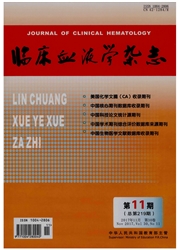

 中文摘要:
中文摘要:
目的:探讨Id4基因甲基化作为预测因子在完全缓解急性淋巴细胞白血病(ALL)病情监测中的意义。方法:采用甲基化特异性PCR(MS-PCR)对经诱导缓解和巩固强化4疗程后持续完全缓解的27例ALL患者进行Id4基因启动子区甲基化状况分析,并随诊3个月以上。结果:16例检测到Id4基因甲基化的ALL中,7例在随访期出现复发,复发率43.75%。另外11例Id4基因非甲基化的患者在随访期只有1例复发,复发率9.09%。结论:骨髓完全缓解的ALL患者,如检测到Id4基因启动子区甲基化,其3个月内的复发率明显高于非甲基化患者。对完全缓解的ALL患者来说,如Id4基因启动子区持续检测到甲基化,可能提示ALL患者短期内复发。
 英文摘要:
英文摘要:
Objective: To investigate the significance of Id4 gene promoter methylation in complete remission (CR) ALL patients. Method:S-PCR methods were used to detect the promoter methylation status of Id4 gene in bone marrow samples from CR ALL patients who had accepted induction and 4 consolidation chemotherapy. The follow-up period was at least three months. Result: Among the all 27 patients, 16 of them were found Id4 promoter methylation. In these 16 patients, 7 of the them were relapsed (43.75%). While in the 11 patients with Id4 unmethylation, only one was relapsed, the relapse rate was 9.09%. Conclusion.. In CR ALL patients, the relapse rate in Id4 promoter methylation group was higher than the unmethylation group. The ALL patients in CR with Id4 promoter methylation might be relapsed in the short.
 同期刊论文项目
同期刊论文项目
 同项目期刊论文
同项目期刊论文
 期刊信息
期刊信息
